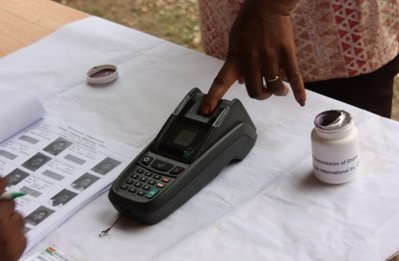'I would have allowed people to vote without verification' -Afari Gyan
Arku Jasmine
Politics
 Chairman for the Electoral Commission, Dr Afari Gyan has told the court that he would have permitted prospective voters to vote without verification if biometric verification failed to recognize their their finger prints.
Chairman for the Electoral Commission, Dr Afari Gyan has told the court that he would have permitted prospective voters to vote without verification if biometric verification failed to recognize their their finger prints. He told the court Wednesday that “if I were the presiding officer, I would let you go and vote because the essence of verification is to establish the true identity of the prospective voter.”
Dr Afari Gyan’s statement was in response to a question by counsel for the petitioners, Mr Philip Addison, who sought to find out the main purpose for the biometric verification and whether it was able to serve the purpose.
Mr Addison asked the EC Chairman to tell the court the main purpose for which the biometric verification was introduced for the elections.
Dr Afari Gyan explained that the biometric verification was introduced in order for the EC to be able to more closely identify the prospective voter before giving him or her the ballot paper, while preventing people from impersonation and in effect, multiple voting.
On that note, Mr Addison further enquired if the introduction of the biometric verification was able to eradicate the practices of impersonation and multiple voting from the last elections.
In his response, the EC Chairman stated that, in its totality, the biometric verification possibly eliminated those practices, but for the human element in the administration of the election.
He further cited a scenario explaining that, “On election day, I’m the presiding officer, you come to the station, the machine takes your picture but is not able to take your finger prints, if I were the presiding officer, I would let you go and vote because the essence of verification is to establish the true identity of the prospective voter. That is the human element.”
“So you are telling this court that presiding officers have the discretion to allow people vote without verification?” Mr Addison enquired.
Dr Afari Gyan rhetorically stated that, “For example, the paramount chief of the town comes to the polling station and you know him to be the paramount chief and you know his name is in the voter’s register but that machine will not take his finger prints and you say Nana you can’t vote?”
“So in effect, Nana can vote without verification? So there will be no indication of it on the verification machine? Is that what you are telling the court?” asked Mr Addison.
Sounding rather skeptical, Dr Afari Gyan responded, “Yea, what do you want me to say?”
Meanwhile, the EC Chairman has been reminded by the bench of his position as a witness in the ongoing election petition, and that he was not permitted to throw questions back to the counsel for the petitions.
The rebuke was as a result of the EC Chairman’s hesitance to explain to the court a document labeled Form 1A which was presented by Mr Philip Addison in an attempt to understand the registration process ahead of the elections during his cross-examination of the witness.
When lawyer Philip Addison sought from Dr Afari Gyan whether he was aware of any form called Form 1A, HE (Dr Afari Gyan) retorted, “What is Form 1A?”
Immediately, his attention was drawn to the fact that he was a witness and thus was not allowed to ask questions.
He, thus, apologized and asked to see the form “because I don’t keep those things in my head”.
Mr Addison further probed, “Dr afari gyan, you have never heard of Form 1A?”
“I’ve heard of it.”
“So what is it? You are the chairman of the electoral commission,” Mr Addison asked.
Dr Afari Gyan explained then that the Form 1A was used for capturing the details that were indicated on the registration form during the registration process.
Story: Jasmine Arku/Graphic.com.gh
[email protected]